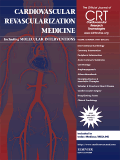
Cardiovascular Revascularization Medicine
Scope & Guideline
Pioneering Insights for Heart Health Professionals
Introduction
Aims and Scopes
- Percutaneous Coronary Intervention (PCI) Techniques:
The journal emphasizes innovative techniques and methodologies in PCI, exploring advancements in technologies such as drug-eluting stents, bioresorbable scaffolds, and various atherectomy methods. - Transcatheter Aortic Valve Replacement (TAVR):
A significant focus is on TAVR, including studies on procedural outcomes, device innovations, and patient selection criteria, particularly in high-risk populations. - Management of Cardiogenic Shock:
Research on the management strategies for cardiogenic shock, including the use of mechanical circulatory support devices like Impella and intra-aortic balloon pumps, is a prominent area. - Coronary Artery Disease and Its Complications:
The journal covers various aspects of coronary artery disease, including acute coronary syndromes, chronic total occlusions, and associated complications, fostering a deeper understanding of patient management. - Health Disparities in Cardiovascular Care:
Emerging themes in the journal include addressing health disparities in cardiovascular care, particularly regarding race, gender, and socioeconomic status, ensuring equitable treatment access and outcomes. - Innovative Imaging and Diagnostic Techniques:
The use of advanced imaging modalities, such as optical coherence tomography and intravascular ultrasound, to guide interventions and improve diagnostic accuracy is a key focus area.
Trending and Emerging
- Artificial Intelligence and Machine Learning:
The integration of AI and machine learning in predicting outcomes and optimizing treatment strategies is gaining traction, showcasing the potential for technology to enhance clinical decision-making. - Personalized Medicine:
There is an increasing emphasis on personalized medicine approaches, particularly regarding tailored therapies based on genetic, ethnic, and individual patient profiles, enhancing treatment efficacy. - Novel Devices and Techniques:
Research on innovative devices, such as next-generation transcatheter heart valves and advanced closure devices, is on the rise, reflecting an ongoing commitment to improving procedural success rates. - Focus on Patient-Centered Outcomes:
Emerging attention on patient-reported outcomes and quality of life measures post-intervention is becoming more prevalent, indicating a shift towards holistic patient care. - Management of Comorbidities:
The intersection of cardiovascular disease with other health conditions, such as diabetes, chronic kidney disease, and cancer, is increasingly explored, addressing the complexity of patient management. - Post-Procedure Complications and Outcomes:
Research into the long-term outcomes and complications following various interventions, particularly in high-risk populations, is trending, emphasizing the importance of follow-up care.
Declining or Waning
- Traditional Surgical Approaches:
There is a noticeable decline in focus on traditional surgical revascularization methods, such as coronary artery bypass grafting (CABG), as newer, less invasive techniques gain preference. - Outdated Technologies:
Research on older technologies, such as bare-metal stents and first-generation drug-eluting stents, is less frequent, indicating a shift towards more advanced and effective treatment options. - General Patient Population Studies:
Studies focusing on broad, general patient populations without specific sub-group analysis are becoming less common, as the journal increasingly prioritizes research that addresses specific, high-risk populations or novel interventions. - Basic Science Research:
There is a waning interest in basic science research related to cardiovascular interventions. The journal now favors clinical studies that provide direct implications for practice and patient outcomes.
Similar Journals

Expert Review of Cardiovascular Therapy
Fostering Innovation in Cardiovascular MedicineExpert Review of Cardiovascular Therapy is a leading academic journal published by TAYLOR & FRANCIS INC, focusing on innovative and impactful research in the field of cardiovascular medicine. With an ISSN of 1477-9072 and an E-ISSN of 1744-8344, this journal serves as an essential resource for researchers, clinicians, and educators, offering a platform for the dissemination of critical advancements in cardiovascular therapy and internal medicine. Since its inception in 2003, the journal has maintained a reputable standing with a Q2 ranking in various categories including Cardiology and Cardiovascular Medicine, reflecting its influence and rigor in the field. The journal, which is based in the United Kingdom, does not currently offer Open Access options, ensuring that its content is accessible primarily to subscribers. With its commitment to high-quality, peer-reviewed articles, Expert Review of Cardiovascular Therapy is dedicated to bridging the gap between experimental research and clinical application, thereby enhancing patient care and therapeutic outcomes in cardiovascular health.
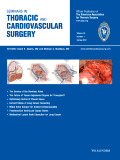
Seminars in Thoracic and Cardiovascular Surgery
Empowering Innovation in Surgical ExcellenceSeminars in Thoracic and Cardiovascular Surgery, published by Elsevier Inc, is a prestigious journal that focuses on advancing the fields of thoracic and cardiovascular surgery, cardiology, and pulmonary medicine. With a strong impact factor and an impressive reputation indicated by its 2023 rankings as Q2 in Cardiology and Cardiovascular Medicine, and Q1 in both Medicine (miscellaneous) and Surgery, the journal occupies a critical space in the academic landscape. Established in 1989, it has become a vital resource for researchers, clinicians, and students alike, fostering innovation through comprehensive reviews and cutting-edge studies. Although it does not offer open access, its robust editorial standards ensure that published articles contribute significantly to the ongoing discourse in surgical techniques and procedural advancements. Researchers and practitioners are encouraged to explore its rich compendium of peer-reviewed content that informs clinical practices and guides future investigations in the dynamic and evolving realm of thoracic and cardiovascular health.
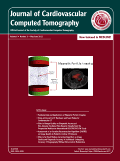
Journal of Cardiovascular Computed Tomography
Connecting experts in the realm of cardiovascular imaging.The Journal of Cardiovascular Computed Tomography, published by Elsevier Science Inc, is a premier international journal dedicated to the field of cardiovascular imaging and technology. With a strong impact factor, it serves as a pivotal platform for disseminating cutting-edge research and advancements from 2007 to 2024, specifically within the realms of cardiology and radiology. The journal holds a distinguished Q1 ranking in both Cardiology and Cardiovascular Medicine and Radiology, Nuclear Medicine and Imaging, reflecting its influential role in shaping clinical and academic discourse in these fields. Notably, the journal boasts impressive Scopus rankings, placing it in the top decile of its categories, highlighting its high-quality publications and significant contribution to the scientific community. Although it does not operate under an open access model, it ensures robust accessibility for researchers, professionals, and students eager to stay informed about the latest innovations and studies in cardiovascular computed tomography. The Journal of Cardiovascular Computed Tomography is essential for anyone involved in cardiovascular research, offering valuable insights and fostering collaborations across disciplines.
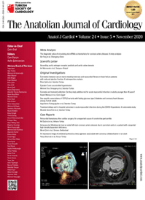
Anatolian Journal of Cardiology
Transforming Cardiology with Rigorous Research and Peer Review.The Anatolian Journal of Cardiology, published by KARE PUBL, stands as a vital resource in the field of Cardiology and Cardiovascular Medicine. With an ISSN of 2149-2263 and E-ISSN 2149-2271, this Open Access journal has been fostering the dissemination of critical research since 2001, ensuring that high-quality content is freely available to a global audience. Based in Turkey, the journal aims to bridge gaps in cardiological knowledge through rigorous peer-reviewed articles that span a wide range of topics, from innovative clinical practices to groundbreaking research findings. While its current ranking places it in the Q3 category of cardiology journals, the Anatolian Journal of Cardiology continues to strive towards enhancing its impact, currently holding a Scopus rank of 236 out of 387. Researchers, practitioners, and students alike will find this journal an essential platform for keeping abreast of the latest developments in cardiovascular health.

Heart International
Elevating the discourse on heart health with impactful research.Heart International is a prominent open-access journal dedicated to the fields of cardiology and cardiovascular medicine, published by TOUCH MEDICAL MEDIA LTD since 2006. Based in Italy, this journal serves as a vital platform for researchers, clinicians, and students, aiming to disseminate cutting-edge scientific findings and clinical insights that advance the understanding of heart health. With an ISSN of 2036-2579 and an emphasis on accessible content, Heart International ensures that valuable research is available to a wide audience, thereby contributing to the global discourse on cardiovascular issues. Although it currently holds a Q4 quartile ranking in its category and is positioned in the lower percentile for Scopus rankings, the journal is committed to improving its impact through rigorous peer review and high-quality publications. The journal covers a wide array of topics within the cardiology domain, making it an essential resource for those looking to stay abreast of the latest developments in heart research.

CANADIAN JOURNAL OF CARDIOLOGY
Your Source for Groundbreaking Cardiology DiscoveriesCanadian Journal of Cardiology (ISSN: 0828-282X, E-ISSN: 1916-7075), published by Elsevier Science Inc, serves as a vital platform for disseminating high-quality research in the dynamic field of cardiology and cardiovascular medicine. Since its inception in 1985, this journal has established itself as a leader in the field, currently holding a prestigious Q1 ranking in Cardiology, indicating its significant impact and contribution to medical science. With a Scopus rank of #50 out of 387 in its category and placing in the 87th percentile, the journal showcases rigorous peer-reviewed articles that advance knowledge and practice in cardiology. Although the journal is not open access, it provides valuable insights and research findings that cater to clinicians, researchers, and students who are committed to improving cardiovascular health. As we approach the convergence of years to 2024, the Canadian Journal of Cardiology continues to strive for excellence, facilitating a discourse vital for both academic and clinical advancements in cardiology.
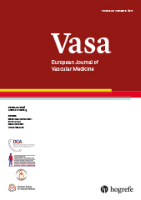
Vasa-European Journal of Vascular Medicine
Fostering Insights in Cardiovascular Health and PracticeVasa - European Journal of Vascular Medicine is a leading peer-reviewed journal dedicated to advancing the field of vascular medicine, published by HOGREFE AG in Switzerland. With a proud history dating back to 1972, this journal serves as a critical platform for researchers, clinicians, and healthcare professionals committed to enhancing knowledge and practice related to cardiovascular health and vascular disorders. Holding a notable Q2 ranking in the cardiology and cardiovascular medicine category, Vasa’s scholarly contributions reflect high-quality research and innovative insights that drive clinical applications. The journal provides essential access to original articles, reviews, and case studies, fostering a vibrant exchange of ideas within the vascular medicine community. Its Scopus rank of #159 out of 387 further underscores its impact, placing it confidently in the 59th percentile among its peers. Vasa is synonymous with rigorous academic standards and relevance, making it an invaluable resource for anyone seeking to stay at the forefront of vascular research and its clinical implications.

Indian Journal of Thoracic and Cardiovascular Surgery
Advancing the Frontiers of Cardiovascular and Thoracic MedicineIndian Journal of Thoracic and Cardiovascular Surgery, published by SPRINGER INDIA, serves as a vital platform for the dissemination of innovative research and clinical advancements in the fields of cardiology, cardiovascular medicine, pulmonary, and respiratory medicine. With a rich history dating back to 1982 and spanning multiple years through to 2024, this journal aims to provide a comprehensive view of both theoretical and practical aspects of thoracic and cardiovascular surgery. Although it currently holds a Q3 quartile ranking across various relevant categories, researchers and practitioners can benefit from its insightful articles that contribute to ongoing discussions and advancements in these critical medical areas. The journal does not offer open access presently, yet it is accessible through major academic databases, providing valuable resources for professionals and students keen on enhancing their understanding and expertise. In a rapidly evolving field marked by technological advancements and novel research, the Indian Journal of Thoracic and Cardiovascular Surgery remains integral to fostering collaboration and education among its audience.
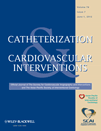
CATHETERIZATION AND CARDIOVASCULAR INTERVENTIONS
Pioneering Minimally Invasive Solutions for Heart HealthCatheterization and Cardiovascular Interventions is a leading peer-reviewed journal published by Wiley, dedicated to advancing the fields of cardiology, cardiovascular medicine, and radiology. With an impressive impact factor and categorized in the Q1 quartile across multiple disciplines—including Cardiology, Medicine, and Radiology—this journal serves as an essential resource for researchers, clinicians, and students interested in the latest developments in minimally invasive techniques and innovative cardiovascular therapies. Since its inception in 1999 and continuing through 2024, Catheterization and Cardiovascular Interventions has provided a platform for high-quality original research, reviews, and case studies, highlighting approaches that improve patient outcomes and treatment methodologies. Operating from the United States, the journal offers various access options, making key findings in cardiovascular interventions readily available to its audience. Stay at the forefront of cardiovascular innovation by engaging with this pivotal publication.
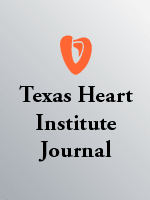
TEXAS HEART INSTITUTE JOURNAL
Advancing Cardiovascular Knowledge, One Heartbeat at a Time.TEXAS HEART INSTITUTE JOURNAL, published by the renowned Texas Heart Institute, stands as a pivotal resource in the field of cardiology and cardiovascular medicine. With a history spanning over four decades since its establishment in 1982, this journal addresses a wide range of topics within its scope, including clinical studies, innovative treatments, and groundbreaking research in heart health. Despite its Q3 ranking in both Cardiology and Cardiovascular Medicine, the journal is committed to fostering advancement in medical knowledge and practice, providing an essential platform for healthcare professionals and researchers alike. While currently lacking open access, the journal is recognized for its contributions to the field, aiming to illuminate critical healthcare discussions and promote the exchange of ideas. For those interested in staying at the forefront of cardiovascular research, TEXAS HEART INSTITUTE JOURNAL offers invaluable insights and the latest developments shaping the future of heart care.